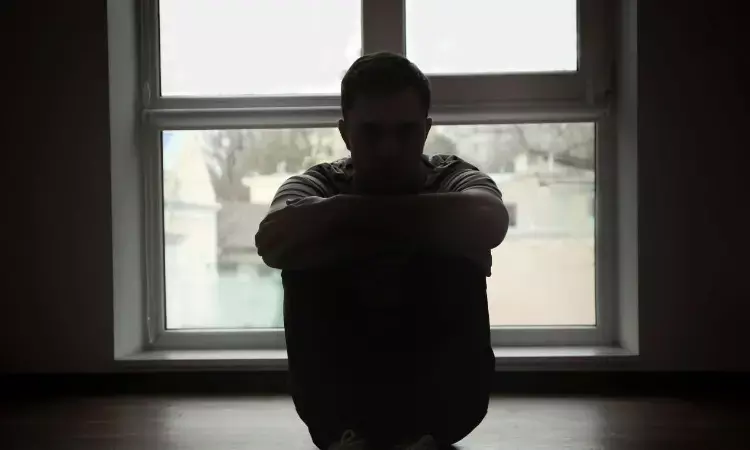- Home
- Medical news & Guidelines
- Anesthesiology
- Cardiology and CTVS
- Critical Care
- Dentistry
- Dermatology
- Diabetes and Endocrinology
- ENT
- Gastroenterology
- Medicine
- Nephrology
- Neurology
- Obstretics-Gynaecology
- Oncology
- Ophthalmology
- Orthopaedics
- Pediatrics-Neonatology
- Psychiatry
- Pulmonology
- Radiology
- Surgery
- Urology
- Laboratory Medicine
- Diet
- Nursing
- Paramedical
- Physiotherapy
- Health news
- Fact Check
- Bone Health Fact Check
- Brain Health Fact Check
- Cancer Related Fact Check
- Child Care Fact Check
- Dental and oral health fact check
- Diabetes and metabolic health fact check
- Diet and Nutrition Fact Check
- Eye and ENT Care Fact Check
- Fitness fact check
- Gut health fact check
- Heart health fact check
- Kidney health fact check
- Medical education fact check
- Men's health fact check
- Respiratory fact check
- Skin and hair care fact check
- Vaccine and Immunization fact check
- Women's health fact check
- AYUSH
- State News
- Andaman and Nicobar Islands
- Andhra Pradesh
- Arunachal Pradesh
- Assam
- Bihar
- Chandigarh
- Chattisgarh
- Dadra and Nagar Haveli
- Daman and Diu
- Delhi
- Goa
- Gujarat
- Haryana
- Himachal Pradesh
- Jammu & Kashmir
- Jharkhand
- Karnataka
- Kerala
- Ladakh
- Lakshadweep
- Madhya Pradesh
- Maharashtra
- Manipur
- Meghalaya
- Mizoram
- Nagaland
- Odisha
- Puducherry
- Punjab
- Rajasthan
- Sikkim
- Tamil Nadu
- Telangana
- Tripura
- Uttar Pradesh
- Uttrakhand
- West Bengal
- Medical Education
- Industry
Post COVID-19 pandemic Stress Disorder common occurrence among Health Care Personnel

The COVID-19 pandemic is, in many ways, the greatest worldwide epidemic in over a century, due to its widespread nature, severity, and complicated and long-term consequences.
Apart from the virus's devastating direct health effects, other aspects of the pandemic-such as the fear of transmission, the consequences of interventions to reduce transmission, massive economic strain, societal disruption, and the loss of family and friends-undoubtedly have a complex impact on mental health. Millions of people have been impacted by COVID-19 worldwide, making it a legitimate threat to global health.
Frontline healthcare personnel who treat and care for patients who have SARS-CoV-2 infection are at risk of experiencing psychological distress and other mental health symptoms due to this severe circumstance. The mental toll on this personnel may have been exacerbated by an increase in the number of confirmed or suspected cases, an excessive workload, extensive media coverage, a shortage of particular medications, and emotions of being undersupported, fragility, or loss of control.
Postpandemic stress disorder (PPSD) is an unofficial term that refers to posttraumatic stress disorder (PTSD), a mental disorder resulting from increased stress, anxiety, and trauma associated with unpleasant life experiences. Many scientific studies indicate that symptoms of increased stress, job burnout, anxiety, and depressive disorders are associated with medical personnel performing their professional duties around COVID-19 patients.
Researchers in Poland assessed the prevalence of symptoms that may indicate the presence of PPSD symptoms—depression, anxiety, and stress—in medical personnel. They surveyed 300 people, all representatives of medical personnel. The group was divided into two sections. The first section numbered 150 and consisted of personnel in direct contact with COVID-19 patients (FR); the second group also consisted of 150 medical professionals, who but no longer directly involved in helping with COVID-19 cases (SR). The survey was conducted by indirect survey method using CAWI (computer-assisted web interview). The survey used a questionnaire technique.
Their study showed that t in the first period (last quarter of 2020) there were 6% cases of moderate depression in the FR group, and in the second period (last quarter of 2021) there were 2% cases of moderate depression. During the same periods in the SR group, there were 30% cases of mild and 10% of moderate anxiety (2020) and 34% of mild and 6% of moderate anxiety (2021). Severe anxiety symptoms were observed in 16% (2020) and 10% (2021) of the FR group and 4% (2020) and 6% (2021) of the SR group. The association of severity of anxiety symptoms with the group of medics performing COVID-19 patient contact work was statistically significant.
The prevalence of sleep problems in COVID-19 medical staff was higher than in other population groups, probably as a result of stress, which is a well-known source of sleep dis- ruptions among HCPs.
According to this study, the COVID-19 pandemic significantly increased the prevalence of depression, anxiety, and stress among first responders. To ensure the psychological well-being of first responders, early assessment and care of mild depression, anxiety, and stress should be promoted to prevent the development of moderate and severe forms. To avoid both the immediate and long-term effects of these detrimental psychological outcomes, first responders should have access to essential support programs and interventions for the management of depression, anxiety, and stress.
Reference : Postpandemic Stress Disorder among Health Care Personnel: A Cross-Sectional Study (Silesia, Poland)
Mateusz Grajek ,1 Patryk Szlacheta,2 Karolina Sobczyk,3 Karolina Krupa-Kotara,4 Beata Łabuz-Roszak ,5 and Ilona Korzonek-Szlacheta6 Behavioural Neurology Volume 2022, Article ID 1816537, DOI: https://doi.org/10.1155/2022/1816537
MBBS, DrNB Neurosurgery
Krishna Shah, MBBS, DrNB Neurosurgery. She did her MBBS from GMC, Jamnagar, and there after did direct 6 Year DrNB Neurosurgery from Sir Ganga Ram Hospital, Delhi. Her interests lie in Brain and Spine surgery, Neurological disorders, minimally invasive surgeries, Endoscopic brain and spine procedures, as well as research.
Dr Kamal Kant Kohli-MBBS, DTCD- a chest specialist with more than 30 years of practice and a flair for writing clinical articles, Dr Kamal Kant Kohli joined Medical Dialogues as a Chief Editor of Medical News. Besides writing articles, as an editor, he proofreads and verifies all the medical content published on Medical Dialogues including those coming from journals, studies,medical conferences,guidelines etc. Email: drkohli@medicaldialogues.in. Contact no. 011-43720751


